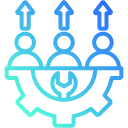Personal Development Tools for Team Members
Personal development tools are essential resources for team members aiming to enhance their skills, productivity, and overall well-being within a professional environment. These tools go beyond traditional job training by empowering individuals to take charge of their growth, increase self-awareness, and foster stronger collaboration. Embracing personal development within teams not only benefits the individual but creates a positive ripple effect, boosting morale and driving collective success. This page explores a curated set of tools and techniques that can help every team member unlock their potential, overcome challenges, and contribute more meaningfully to shared goals.
Goal Setting and Progress Tracking
The SMART Goals Framework guides team members in crafting objectives that are Specific, Measurable, Achievable, Relevant, and Time-bound. By following this methodology, individuals gain clarity about what they wish to accomplish and how to measure their advancement. The framework encourages thoughtful planning, requiring users to define concrete success markers and realistic timelines. This approach reduces ambiguity, mitigates procrastination, and enhances accountability, making it easier for team members to track accomplishments and identify areas for improvement. Ultimately, SMART goals foster a proactive growth mindset essential for personal and professional advancement.

Active Listening Techniques
Active listening techniques empower team members to fully engage during conversations, ensuring that they understand and process what others are communicating. These methods may include summarizing key points, asking clarifying questions, and providing nonverbal feedback like nodding. By practicing active listening, individuals foster trust and respect, reducing misunderstandings and conflict within the team. Enhanced listening supports a collaborative atmosphere where everyone feels heard, valued, and more willing to share their perspectives, ultimately boosting team effectiveness.
Constructive Feedback Models
Constructive feedback models, such as the “Situation-Behavior-Impact” approach, provide a clear structure for giving and receiving feedback in a way that is objective and productive. These models encourage team members to focus feedback on observable behavior and its effects, rather than personal attributes. Practicing this tool helps individuals develop resilience and openness to improvement, while also learning to communicate criticisms in a supportive manner. Over time, a culture of constructive feedback leads to continuous development, higher morale, and stronger working relationships.
Digital Collaboration Platforms
Digital collaboration platforms, like shared workspaces and messaging apps, enable seamless communication and feedback among team members, regardless of location. These platforms offer features such as real-time editing, instant messaging, and threaded discussions, which help teams brainstorm, resolve issues, and keep everyone on the same page. By making communication more accessible and documentation centralized, these tools encourage transparency, streamline workflows, and ensure that feedback is both timely and actionable.

Self-Awareness Assessments
Self-awareness assessments are designed to help individuals gain insight into their emotional triggers, strengths, and areas for improvement. Through surveys, personality quizzes, or reflection exercises, team members can identify their default reactions and emotional patterns. This heightened awareness allows for more deliberate self-regulation, improved stress management, and healthier interactions with colleagues. When team members understand themselves better, they are more equipped to communicate authentically and contribute to a psychologically safe workspace.

Mindfulness and Stress Management Apps
Mindfulness and stress management apps provide guided meditations, breathing exercises, and self-reflection prompts that help team members remain grounded during periods of high pressure. Regular use of these tools can reduce anxiety and improve focus by encouraging present-moment awareness. By integrating mindfulness practices into the daily routine, individuals become more resilient to workplace setbacks and better able to manage emotional responses. The cumulative effect is a calmer, more balanced team environment where members can perform at their best.
